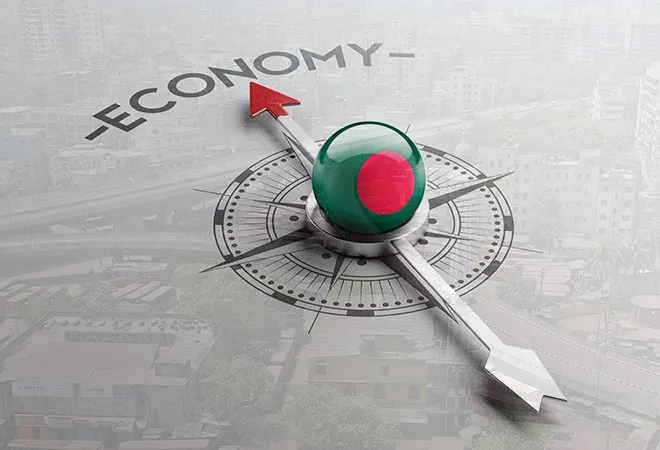The Role of Government Policies in Shaping Bangladesh’s Economic Future
Over the past two decades, Bangladesh has transformed from a low-income agrarian economy to one of the fastest-growing economies in South Asia. At the heart of this transformation lies a blend of strategic government policies, international investments, labor-intensive industries, and expanding trade agreements. With GDP growth averaging 6-7% annually (pre-COVID), the question is: what role will government policies continue to play in shaping Bangladesh’s economic future?
This article explores the impact of major government initiatives, regulatory reforms, and long-term development strategies that are driving Bangladesh’s journey toward becoming a middle-income and eventually developed nation.
📈 1. Vision 2041: The Long-Term Roadmap
The Government of Bangladesh has outlined a clear development trajectory through its Vision 2041 plan, which aims to make the country a developed economy by the year 2041. The policy framework is centered on:
-
Achieving high-income status
-
Advancing human capital
-
Expanding industrial diversification
-
Promoting innovation and technology
-
Strengthening global competitiveness
To learn more, visit Bangladesh’s Planning Commission Vision 2041.
🏭 2. Economic Zones and Industrial Parks
A core policy driving industrial growth is the Bangladesh Economic Zones Authority (BEZA) initiative. With over 100 proposed economic zones (EZs), the goal is to attract both local and foreign direct investment (FDI) in sectors like:
-
Ready-made garments (RMG)
-
Pharmaceuticals
-
Leather goods
-
Electronics and ICT
-
Agro-processing
These zones offer incentives such as tax holidays, 100% foreign ownership, and faster customs processing.
Explore current investment opportunities at beza.gov.bd
🌐 3. Export Policy and Trade Agreements
To maintain global competitiveness, the Export Policy 2021–2024 introduced reforms including:
-
Simplified VAT processes for exporters
-
New priority sectors beyond garments (e.g., jute, IT services, shipbuilding)
-
Promoting non-traditional markets (Latin America, Africa, and CIS countries)
Moreover, Bangladesh has been actively seeking free trade agreements (FTAs), including ongoing discussions with countries like China and India.
For trade and export support, visit epb.gov.bd
🏗️ 4. Infrastructure and Connectivity Development
Mega projects backed by government funding and international loans are reshaping the logistical landscape:
-
Padma Bridge: Now operational, connects the southwest region to Dhaka, reducing transport time and boosting trade.
-
Dhaka Elevated Expressway: Eases city congestion and improves goods movement.
-
Matarbari Deep Sea Port and Payra Port: Will increase capacity for global freight handling.
These projects are part of the broader Delta Plan 2100, an initiative focused on water resource management and climate-resilient infrastructure.
Learn about the Delta Plan at gedkp.gov.bd
💻 5. Digital Bangladesh and ICT Expansion
Under the “Digital Bangladesh” initiative, the government has introduced policies that are pushing the country into the digital era. These include:
-
Development of ICT parks and high-tech parks
-
Digital tax filing systems
-
Expansion of e-governance and public services
-
Encouraging startups through the Innovation Design and Entrepreneurship Academy (iDEA)
These moves support Bangladesh’s ambitions of becoming a regional ICT and tech outsourcing hub.
Visit digitalbangladesh.gov.bd for updates.
⚖️ 6. Regulatory and Financial Reforms
To encourage investment and financial sector stability, the government is working on:
-
Banking reforms to reduce non-performing loans (NPLs)
-
Promoting mobile banking and financial inclusion via platforms like bKash
-
Introducing new rules for stock market transparency under the Bangladesh Securities and Exchange Commission (BSEC)
These steps aim to build investor confidence and increase capital market participation.
Track financial reforms at bb.org.bd and sec.gov.bd
🌱 7. Sustainability and Green Economy Policies
Environmental sustainability is gradually becoming part of Bangladesh’s policy landscape, particularly due to the country’s climate vulnerability. Government support includes:
-
Promoting green garment factories with LEED certifications
-
Offering incentives for renewable energy investments
-
Partnering with international climate funds like the Green Climate Fund (GCF)
These policies aim to align Bangladesh’s growth with global environmental standards.
Read more about green policies from moefcc.gov.bd
📊 8. Taxation and Ease of Doing Business
The government has committed to improving the ease of doing business, currently ranked 168th globally. Measures include:
-
Online company registration via the Registrar of Joint Stock Companies (RJSC)
-
Streamlined VAT and tax filing via the National Board of Revenue (NBR)
-
Proposed one-stop service portals for trade and investment clearance
Tax incentives are also being extended to startups and green tech companies.
Visit nbr.gov.bd for current taxation guidelines.
🚀 The Road Ahead: Challenges and Opportunities
While the policy environment is improving, there are challenges to address:
-
Bureaucracy and corruption
-
Delays in implementation
-
Policy inconsistency across regimes
-
Pressure from upcoming LDC graduation in 2026
That said, the future of Bangladesh’s economy is promising, especially for businesses in logistics, sourcing, digital services, and green industries.
🔗 Conclusion
Bangladesh’s economic transformation isn’t just a story of organic growth—it is actively shaped by forward-thinking government policies across sectors. As the country moves closer to LDC graduation and beyond, expect continued focus on infrastructure, sustainability, digitalization, and global integration.
For global investors, entrepreneurs, and sourcing agents, now is the time to align your strategy with Bangladesh’s policy roadmap.
💡 Want help navigating the market? Visit Bangladesh-Agent.com for expert guidance, compliance assistance, and local market intelligence tailored to your industry.
